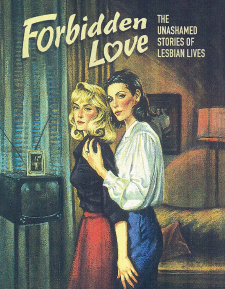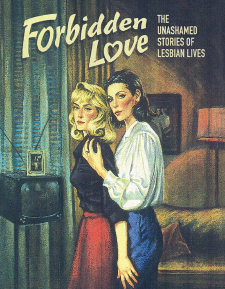Forbidden Love: The Unashamed Stories of Lesbian Lives (Blu-ray Review)

Director
Lynne Fernie and Aerlyn WeissmanRelease Date(s)
1992 (July 26, 2022)Studio(s)
Canadian International Pictures/Vinegar Syndrome- Film/Program Grade: B+
- Video Grade: B-
- Audio Grade: B
- Extras Grade: A-
Review
Forbidden Love: The Unashamed Stories of Lesbian Lives is a 1992 documentary about the experiences of Canadian women who had to navigate their personal orientation during the sexual repression of the Forties, Fifties, and Sixties. The style of the film was inspired by lesbian pulp novels of the era, which offered readers a steamy glimpse of illicit sexuality, but usually punished the female characters in the end. Directors Lynne Fernie and Aerlyn Weissman created a dramatized story that brought those novels to life, and then used that as a framing device to surround interviews that they had filmed with various women who had really lived through the period. The framing story shows the fantasy, while the interviews prove the reality.
The biggest issue for these women was finding a safe space that would provide a sense of community for them. Since it was dangerous to be open about their own sexuality, some of them weren’t even sure what reality actually was. (One of them says that since the books were frequently set in Greenwich Village, she and her partner packed everything up and traveled to New York City to “look for the lesbians.”) Ultimately, most of them found sanctuary in the gay-friendly bars of the era, though that wasn’t without its own risks. There were police raids, arrests, and other forms of harassment—even racial issues, as a couple of the women attest. Yet despite all of the challenges in simply trying to live their own lives, they found strength in themselves, and also with each other.
Fernie and Weissman conducted many interviews, but they eventually whittled all of them down to nine different women: Keely Moll, Stephanie Ozard, Reva Hutkin, Lois M. Stewart, Nairobi, Jeanne Healy, Amanda White, Carol Ritchie-MacKintosh, and Ruth Christine. It’s a remarkable collection of unique voices. The filmmakers also included an interview with Ann Bannon, who wrote six lesbian novels during the Fifties and Sixties that are collectively known as The Beebo Binker Chronicles. Unlike most authors at the time, Bannon’s publisher gave her the freedom to create happier endings for her characters.
The idea of using dramatized segments in a documentary film was still a relatively new one in 1992. Just four years earlier, Errol Morris had generated some controversy in the documentary world when he included dramatized re-enactments in his film The Thin Blue Line. Today, of course, dramatizations and re-enactments are de rigueur on networks like The History Channel and Discovery, but it was still a bold choice in 1992. Yet it’s a crucial element in the finished film. Despite the fact that the interviewees faced staunch opposition and even persecution, they eschewed any sense of victimization, and instead found empowerment through their defiance of societal norms. That’s why Forbidden Love embraces the fantasy world of the framing device—it’s a way of reclaiming the dream that was denied by the punitive nature of the pulp novels. It provides a perfect counterpoint to how the real women were able to reclaim their own identities from being lost to time by telling their stories for the camera.
Cinematographer Zoe Dirse shot the interviews for Forbidden Love on standard 16 mm film (she didn’t have access to Super 16), and shot the framing segments on 35 mm film using an Arriflex 35BL camera. Everything was finished in 16 mm, and then blown up to 35 mm for the theatrical release, which was framed at 1.37:1. Since original camera negative for the film has deteriorated and is in fragile condition, this transfer used a 16 mm interpositive instead. The National Film Board of Canada scanned that at 2K resolution, then cleaned it up and graded it digitally. The results look quite clean, though it’s at the expense of the textures of the film medium itself. There’s very little grain present despite the 16 mm origination, so it appears that some noise reduction has been applied. Detail is a little soft, too. Still, given the nature of the film, that’s not really much of an issue. The stock footage in the film shows some damage and instability, but that’s to be expected. The colors tend to be muted, but they usually look natural. It’s a perfectly adequate transfer for a documentary like this.
Audio is offered in English 2.0 mono DTS-HD Master Audio, with optional English subtitles. The audio was restored at 24-bit resolution from the original magnetic tracks. It’s clean, without any noticeable damage, though there’s a bit of excessive sibilance in some of the dialogue. The musical score by Kathryn Moses and the source songs heard throughout all sound fine.
The Canadian International Pictures Blu-ray release of Forbidden Love: The Unashamed Stories of Lesbian Lives comes with a reversible insert that features two variations of the pulp novel covers that were designed for the film (the ones used for the framing device). There was also a slipcover available directly from Vinegar Syndrome, limited to the first 1,000 units, which has already sold out. The following extras are included:
- Director Audio Commentary with Optional Afterward
- Crew Audio Commentary
- The Ann Bannon Chronicles (HD – 17:50)
- Cinema Politica Q&A (HD – 22:48)
- EPK Interview (Upscaled SD – 7:07)
- Afterward (HD – 18:32)
The first commentary track with directors Lynne Fernie and Aerlyn Weissman is moderated by Jean Bruce, who is an Associate Dean at Ryerson University. They open by explaining the reason for the unusual opening title cards—their use of stock footage from the CBC and other sources required a disclaimer, so they decided to undercut that at the end and make a joke of it. They then provide a history of the production, explaining how they had to develop their own network to track down all of the women that they interviewed. The locations were chosen in collaboration with the interviewees, and many of them chose places that they found empowering. Fernie and Weissman’s favorite cut of the film was three hours long and filled with digressions, so while they don’t necessarily regret cutting it down, they’re still happy that the longer cuts are being scanned and digitized at the archives. (It’s a shame that none of the extra footage could be included on this disc.) The most important thing to them was honoring the lives of the women that they featured. This commentary can be played with or without a brief afterward, which is also included as a separate extra on the disc.
The second commentary features Zoe Dirse, as well as sound recordist Justine Pimlott, camera assistant Carolyn Wong, production manager Geeta Sondhi, production assistant Glace Lawrence, and editor Cathy Gulkin. They discuss their experiences running an all-female crew during an era in which that was still uncommon, and what making the film meant to them personally. Since Dirse had been working exclusively in the documentary world, shooting the dramatized segments was her first time working in a fictional context. Gulkin notes how editing has changed in the decades since they made the film—they went to great length to prevent lapses in continuity that wouldn’t even be an issue today. There were also some challenges getting a few of the women to open up, but the all-female nature of the crew helped overcome any inhibitions.
In a way, both of these commentary tracks are perfect extensions of the film itself. Forbidden Love is a priceless record of women telling their stories, and that’s exactly what all of the participants in the commentary tracks are doing as well: telling their own particular stories. The ten women who sat in front of the camera in 1991/1992 are joined decades later by eight of the women who filmed them, and taken as a whole, it’s an invaluable collection. (Note that most of the participants were recorded remotely, so there are a few audio anomalies on both tracks, but nothing that prevents them from being understood.)
The Ann Bannon Chronicles is a new interview with Bannon, in which she provides more details about how she became an author, and also talks about her involvement with the film. The Cinema Politica Q&A was recorded in 2015 at a screening of the film held by Cinema Politica Concordia in Montreal. Directors Fernie and Weissman are joined by Jean Bruce and author Gerda Cammaer, with Dr. Thomas Waugh serving as host. It opens with the introductions prior to the screening, and then jumps to the Q&A that followed it. (They’re joined by Zoe Dirse and actor Lynn Adams at the end.) The EPK Interview with Fernie and Weissman was recorded in 1992 for use by the media when covering the film. It’s divided into segments that could be cut apart and used as needed. Finally, the Afterward is a continuation of the conversation between Fernie and Weissman during the recording of their commentary track. It really does flow most naturally if it’s played together with the commentary, but it’s nice that CIP gave the option to view it separately.
It's not necessarily an extensive collection of extras, but the quality far exceeds the quantity. Forbidden Love: The Unashamed Stories of Lesbian Lives was a landmark film in 1992, especially for Canadian cinema, but it’s been overshadowed in the years since then. This essential Blu-ray from Canadian International Pictures does justice to the film itself, but it also honors the women who made it. Stories like these need to be told.
- Stephen Bjork
(You can follow Stephen on social media at these links: Twitter and Facebook.)

